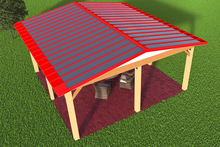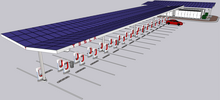
 Solar canopy in parking lot at WSU in Minnesota.
Solar canopy in parking lot at WSU in Minnesota.

Solar canopies are solar arrays installed on canopies, which could be a parking lot canopy, carport, gazebo, Pergola, or patio cover.
Solar canopy parking lots
See also: Green parking lot
The mounting structure makes solar canopy parking lots 50% to twice as expensive to build as traditional grass field solar arrays, but as distributed energy resources they avoid transmission congestion and losses. The canopies can protect the cars and asphalt from extreme weather.
A French law passed in 2023 will require parking lots larger than 50,000 square feet (4,600 m) to build solar canopies covering half their area. This could result in installed capacity of 6.75–11.25 gigawatts, at a cost of $8.7–14.6 billion.
In 2022, the world's largest solar car park canopy opened in the Netherlands with 35 MW capacity.
Rutgers University is building 14.5 MW of solar canopies on parking lots in 2023, which will generate 18 GWh annually, in addition to the 32-acre 8.8 MW solar canopy parking lot already installed there in 2013.
If Walmart Supercenters installed Solar canopies on their 3,500+ parking lots it would generate 11.1 gigawatts of solar power nameplate capacity.
Community Solar
Solar canopies have a lot of potential when developing community solar. Community solar can easily implement solar canopy development to provide nearby residents with a reliable source of renewable energy. This is beneficial for residents wanting to invest in solar that do not have the means to construct panels on their own property. The use of solar canopies in community solar allows more people to have easy and reliable access to renewable resources without as many limitations, such as funds or space, as personal solar panels. This is due to the fact that solar canopies are constructed over preexisting parking lots and other open areas within the community rather than within one's own property. Additionally, the construction of solar canopies within communities helps to provide covered parking areas for residents and can be used for shade in parks and other open spaces that house solar structures.
Gazebos
At parks or backyard patios, gazebos can be installed as a solar canopy. Some studies have looked into the development solar gazebos that rotate in order to follow sunlight as another option for solar energy. These solar panels operate on a Rotating Roof Gazebo System which allows the solar panels to turn towards the sun as it moves throughout the day. This allows for the solar panels to have direct sunlight throughout most of the day unlike stationary solar panels that will only receive full sunlight for a limited period of time. Due to this, rotating solar gazebos can produce a higher percent of solar energy.
These rotating gazebos can be beneficial to community solar as well. As stated in the Community Solar section, community solar provides renewable energy to many residents through solar structures built over parking lots and other open spaces. Rotating gazebos can potential be implemented in a similar fashion to provide higher energy resources to community solar programs.

Tesla Supercharger stations with solar canopies
Some Tesla Supercharger stations have solar canopies installed to protect drivers and vehicles from the elements while recharging. Tesla Megapacks are also installed at some of these locations to store that energy locally.

See also
References
- "How to fight climate change with parking lots". YouTube. 27 September 2023. Archived from the original on 2024-01-03. Retrieved 2024-01-03.
- Birnbaum, Michael (2023-02-08). "New French law will blanket parking lots with solar panels". Washington Post. ISSN 0190-8286. Archived from the original on 2023-03-06. Retrieved 2024-01-03.
- "Largest solar car park in the world opens at Dutch music festival". euronews. 2022-05-11. Archived from the original on 2023-08-12. Retrieved 2024-01-03.
- Lewis, Michelle (2023-06-21). "Rutgers University is still a trailblazer in parking lot solar". Electrek. Archived from the original on 2023-06-30. Retrieved 2024-01-03.
- "Why Putting Solar Canopies on Parking Lots Is a Smart Green Move". Yale E360. Archived from the original on 2024-01-01. Retrieved 2024-01-03.
- Deshmukh, Swaraj Sanjay; Pearce, Joshua M. (2021-05-01). "Electric vehicle charging potential from retail parking lot solar photovoltaic awnings" (PDF). Renewable Energy. 169: 608–617. Bibcode:2021REne..169..608D. doi:10.1016/j.renene.2021.01.068. ISSN 0960-1481.
- ^ Rudge, Kieren (2021-12-01). "The potential for community solar in Connecticut: A geospatial analysis of solar canopy siting on parking lots". Solar Energy. 230: 635–644. Bibcode:2021SoEn..230..635R. doi:10.1016/j.solener.2021.10.038. ISSN 0038-092X.
- "Are solar canopies and carports worth it?". Solar Reviews. 2023-11-14. Retrieved 2024-01-03.
- ^ Kiray, Vedat (December 2019). "Introduction of a System Developed for Increasing the Use of Solar Energy in the Residential Areas "A Rotating Roof Gazebo System"". 2019 15th International Conference on Electronics, Computer and Computation (ICECCO). pp. 1–5. doi:10.1109/ICECCO48375.2019.9247074. ISBN 978-1-7281-5160-1.
- "First Known Tesla V4 Supercharger with Solar Panels & Megapack is Coming to Arizona".